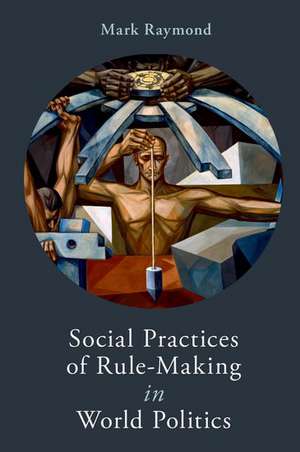Social Practices of Rule-Making in World Politics
Autor Mark Raymonden Limba Engleză Paperback – 21 dec 2022
| Toate formatele și edițiile | Preț | Express |
|---|---|---|
| Paperback (1) | 164.31 lei 10-16 zile | |
| Oxford University Press – 21 dec 2022 | 164.31 lei 10-16 zile | |
| Hardback (1) | 450.35 lei 31-37 zile | |
| Oxford University Press – 11 apr 2019 | 450.35 lei 31-37 zile |
Preț: 164.31 lei
Preț vechi: 188.56 lei
-13% Nou
Puncte Express: 246
Preț estimativ în valută:
31.44€ • 32.64$ • 26.22£
31.44€ • 32.64$ • 26.22£
Carte disponibilă
Livrare economică 21-27 februarie
Preluare comenzi: 021 569.72.76
Specificații
ISBN-13: 9780197674864
ISBN-10: 0197674860
Pagini: 280
Dimensiuni: 236 x 154 x 18 mm
Greutate: 0.42 kg
Editura: Oxford University Press
Colecția OUP USA
Locul publicării:New York, United States
ISBN-10: 0197674860
Pagini: 280
Dimensiuni: 236 x 154 x 18 mm
Greutate: 0.42 kg
Editura: Oxford University Press
Colecția OUP USA
Locul publicării:New York, United States
Recenzii
[A] fantastic achievement. Scholars of international security, global governance, and practice will find the book to be of value. Moreover, policymakers must consider its message: the stakes of modern great-power competition are the rules of the international system, and in this world, skill in rulemaking is as important to a state's national security interests as a bullet on the battlefield. This insight should caution U.S. policymakers who seek a retreat from global governance, as well as encourage the Biden administration as it seeks to restore U.S. leadership in the world.
The book extends practice theory's application beyond specific aspects of world politics (like diplomacy) to the more general phenomenon of argumentation...This approach enables Raymond to make constitutive and causal explanations about the process of rule change.
What goes into the making of successful global rules? In this sweeping and intellectually powerful analysis, Raymond shows that there are generic procedural rules for making rules that apply across contexts. Spanning topics from great power management and collective security to terrorism and cybersecurity, Raymond deftly reveals commonalties in the construction of governance arrangements of all types. A must-read for all students of global governance and international politics.
It's one thing to talk about rules and their properties in the abstract. It's quite another thing to talk about rules in practice-lawyers do this for a living, but only with a limited stock of formal rules; many constructivists talk about informal rules in the wooliest terms. It is altogether something else to map 'the endogenous dynamics of complex rule sets.' These are Mark Raymond's words for his ambitiously conceived, carefully executed project. Finding rules for making rules in four astutely chosen case studies, Raymond shows how two centuries of social construction have given us today's system of international governance.
If global governance is about rule-making and interpretation, these activities are themselves governed by secondary rules. In one of the most thoughtful constructivist works of recent years, Mark Raymond examines how and why social practices of secondary rule-making have structured global security orders from the Concert of Europe to the campaign against al Qaeda and ongoing efforts to regulate cyberwarfare.
The book extends practice theory's application beyond specific aspects of world politics (like diplomacy) to the more general phenomenon of argumentation...This approach enables Raymond to make constitutive and causal explanations about the process of rule change.
What goes into the making of successful global rules? In this sweeping and intellectually powerful analysis, Raymond shows that there are generic procedural rules for making rules that apply across contexts. Spanning topics from great power management and collective security to terrorism and cybersecurity, Raymond deftly reveals commonalties in the construction of governance arrangements of all types. A must-read for all students of global governance and international politics.
It's one thing to talk about rules and their properties in the abstract. It's quite another thing to talk about rules in practice-lawyers do this for a living, but only with a limited stock of formal rules; many constructivists talk about informal rules in the wooliest terms. It is altogether something else to map 'the endogenous dynamics of complex rule sets.' These are Mark Raymond's words for his ambitiously conceived, carefully executed project. Finding rules for making rules in four astutely chosen case studies, Raymond shows how two centuries of social construction have given us today's system of international governance.
If global governance is about rule-making and interpretation, these activities are themselves governed by secondary rules. In one of the most thoughtful constructivist works of recent years, Mark Raymond examines how and why social practices of secondary rule-making have structured global security orders from the Concert of Europe to the campaign against al Qaeda and ongoing efforts to regulate cyberwarfare.
Notă biografică
Mark Raymond is the Wick Cary Associate Professor of International Security and Director of the Cyber Governance and Policy Center at the University of Oklahoma. He has been a Carnegie Fellow at the School of International and Public Affairs at Columbia University, an External Affiliate of the Ostrom Workshop at Indiana University, and a Fellow with the Center for Democracy and Technology.
